Gujarat Board GSEB Solutions Class 8 Social Science Chapter 11 The United Nations (U.N.) Textbook Exercise Important Questions and Answers, Notes Pdf.
Gujarat Board Textbook Solutions Class 8 Social Science Chapter 11 The United Nations (U.N.)
GSEB Class 8 Social Science The United Nations (U.N.) Textbook Questions and Answers
Answer the following questions:
Question 1.
What is global unity ? What is the need to establish an international organization?
Answer:
‘Global Unity’ means the whole world being united. This is necessary for world peace. Massive destruction was caused in most of the countries during World War I. People wanted peace and historical experience proved that it was essential to establish an international organization to safeguard peace in the world, unite countries and promote co-operation.
If all the countries of the world become united with the feeling that the whole world is a family and the Earth is our common home which we must protect only then can ‘world unity’ be obtained.
Question 2.
Under which circumstances was U.N.O. established ?
Answer:
World War II (1939-1945) was more destructive than the previous war. An atomic bomb was used during the World War II. Millions of innocent people were massacred and property worth billions of rupees was destroyed in this war. Almost all countries were affected in some way or the other by this war and it created havoc in the world. Diplomats across the world united to make the world free from the imminent danger of war. The President of U.S.A., Franklin D. Roosevelt put in efforts to establish a world organization.
On 24th October, 1945 United Nations Organization (U.N.O.) was established to promote world peace and take care of the welfare of the people. In the beginning this organization was known as the United Nations Organization U.N.O. but now it is known only as the United Nations (U.N.). The U.N. started with 51 nations as its members. Today the number has grown to 193.
![]()
Question 3.
What are the main objectives of U.N.O. ?
Answer:
Main objectives of U.N.O. :
- To maintain inter-national peace and safety.
- To promote the feeling of friendship among member nations.
- To solve economic, social, cultural and humanity related problems at international level.
- To seek co-operation to create a feeling of respect for human rights and the fundamental right to freedom.
Question 4.
Which are the main organs of the United Nations ?
Answer:
What are the main organs of the United Nations are :
- Secretariat
- General Assembly
- Security Council
- International Court of Justice
- Trusteeship Council and
- Economic and Social Council.
Question 5.
What is the contribution of India in the achievements of the U.N. ?
Answer:
World peace is the main part of India’s foreign policy and India has always co-operated in the achievements of the U.N.O. :
- India has always contributed on a large scale to peace keeping forces of the U.N.
- India had sent a team of doctors to treat the wounded soldiers in the Korean wan.
- Indian delegates holding various posts in the U.N. have contributed to the welfare with their knowledge and experience.
- The great ideals of ‘Panchsheel’ are a gift of India to the world. Thus, the contribution of India in the achievements of the objectives of United Nations is noteworthy.
State whether the following statements are true or false. Put ✓ sign if the statement is true and put ✗ sign if the statement is false:
1. ‘Veto Power’ means the right of denial or to reject the decision of the Security Council.
Answer:
✓
2. India was not an independent nation when the ‘League of Nations ‘ was established.
Answer:
✓
3. Vijayalaxmi Pandit of India was elected as the President of UNESCO.
Answer:
✗
![]()
4. ‘United Nation’s Day’ is celebrated on 26th January every year.
Answer:
✗
5. Five countries are the permanent members of the Security Council of the United Nations.
Answer:
✓
Write a short note on the following:
(1) General Assembly
(2) Security Council
(3) Need for disarmament
Answer:
(1) General Assembly : The organization of countries to discuss and solve international issues. The General Assembly of United Nations (U.N.) can also be called the ‘World Parliament’. Representatives of all member nations attend it. The General Assembly is the biggest organ of the U.N. Every member nation can send at least five representatives to the General Assembly. But every member nation has a right to cast only one vote. The meeting of the General Assembly is held regularly once a year in the month of September. The General Assembly elects its president and vice president every year.
Mrs Vijayalaxmi Pandit of India was elected as the President of the General Assembly of United Nations in 1953-54. The assembly presented the Universal Declaration of Human Rights on 10th December, 1948. The General Assembly can discuss and suggest solutions or give advice on any world issue within the limits prescribed in the Charter of the U.N. The General Assembly immediately draws the attention of Security Council of U.N.O. to any situation which can put the peace and security of the world in danger. The authority to grant membership to a nation lies with the General Assembly.
(2) Security Council: Security Council is the most important organ of U.N. It works to safeguard international peace and security. The Security Council enjoys tremendous powers to manage peace and security in the world. Its aim is, as far as possible, to solve disputes between nations diplomatically. It is the executive council of United Nations. It is made up of 15 members. U.S.A., Russia, United Kingdom (Britain), France and China are its 5 permanent members. The other 10 members are elected by the General Assembly.
The head of the Security Council is known as the ‘Secretary General’. He is appointed by the General Assembly at the recommendation of the Security Council. He works as the Chief Administrative Officer of the U.N. ‘Veto Power’ or ‘Right to Deny’ is a negative vote cast against a proposal made in the Security Council. All five permanent members, who have the ‘Veto Power’, must agree over any decision. If not, they can cast ‘a negative vote,’ and the decision or resolution cannot be passed.
(3) Need for disarmament: If all the countries of the world co-operate with the U.N. world peace can be truly achieved. For world peace it is necessary that all nations agree to the policy of disarmament i.e. they agree to stop the manufacture of deadly weapons of mass destruction. Crores of rupees which are spent on the manufacture of these lethal weapons can be saved and thereby used for the welfare of mankind. Man should realise that the Earth is the only home we have; no other planet has life. So human beings must aim at achieving world peace and universal brotherhood by adopting the policy of disarmament.
Question 4.
Find out the logo of the below mentioned organizations and either stick them or draw them in your notebook and write the full name of the organization:
Answer:
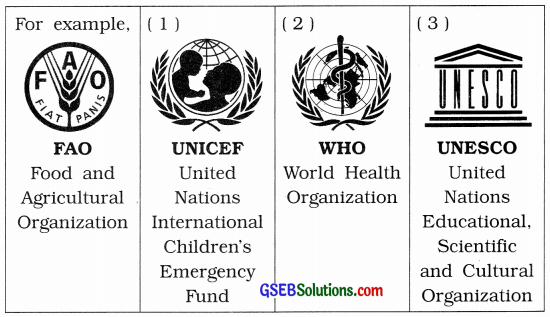
![]()
Question 5.
Identify the logo given below of the organizations working at international level and write down its full name with the help of your teacher, friend or internet:
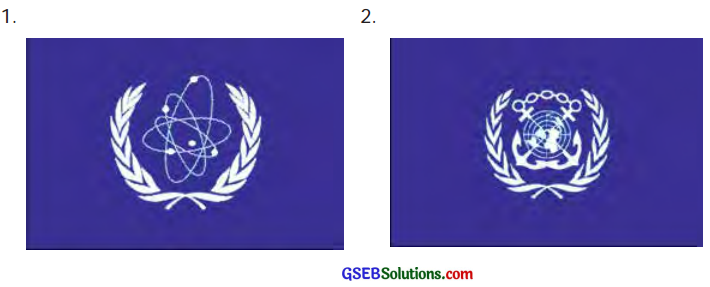
Answer:
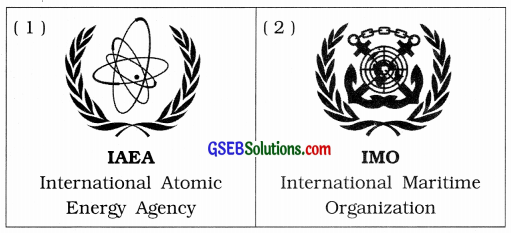
Question 6.
Make a list of sports played in the Olympics. Draw the ground of any two games that are being played in your area. Also write the rules of these games.
Note :
As an answer to this question, the teacher should ask the students to prepare a list of games being played in Olympics. Out of these games grounds of two games which are played in the local area should be drawn and a list of the rules of those games should be prepared. The students should be given freedom to collect information about the game of their choice. Students should be made to play these games, e.g., High jump, Long jump, 100-metre race, Discuss throw, Javelin throw, Volley ball, etc.
Activities
(1) Prepare a report on the special organizations of the United Nations by collecting more information from reference books from the library of your school (logo of the organization, full form, objective of the organization, headquarters, functions, etc.]
(2) Collect articles of news related to United Nations from newspapers and make a collection of these cuttings.
(3) Prepare a list of other organizations working at international level.
(4) Gather more information about the principles of Panchsheel with the help of your teacher or the library and write it down in your notebook.
(5) Collect information about the rules of Panchsheel from your teacher and write it down in your notebook.
(6) Identify the logos of various organizations given below and write the full name of each :
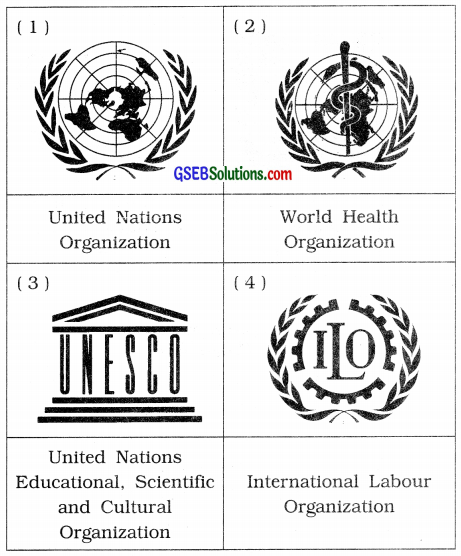
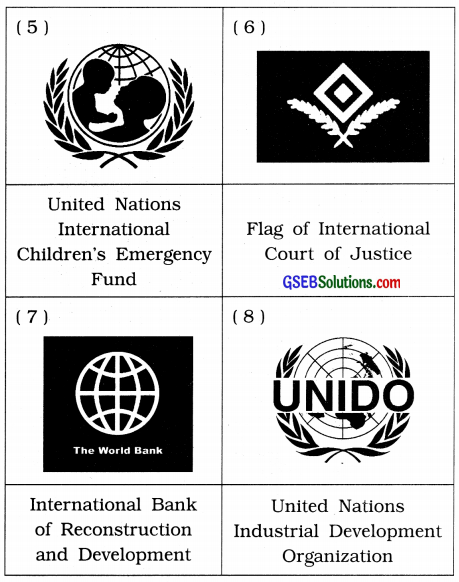
![]()
GSEB Class 8 Social Science The United Nations (U.N.) Intext Questions and Answers
Question 1.
Why is world peace essential?
Answer:
The world has suffered the evil consequences of two horrible and destructive World Wars in the 20th century. Every nation of the world, is frightened and worried because of these wars and craves for peace. There is progress for all in peace only. There is ruin for all in restlessness. Millions of people in the world today are deprived of bread, clothes, food grains, education, medical services, employment, etc.
The only solution to the pitiable condition of these people lies in world peace. Billions of rupees are blown off for the production of weapons, their storage and maintenance. If this money is utilized for the welfare of human-beings, majority of the problems of the whole world will be solved and peace will be established. Of late the countries of the world have realized that the world needs peace and not war.
Question 2.
Why should wars be avoided ?
Answer:
Even after the United Nations (U.N.) was established, wars have continued to occur in the world. The wars which have taken place between U.S.A. and Vietnam, Iran and Iraq, Israel and Palestine, Iraq and Kuwait and India and Pakistan have led to heavy destruction of life and property.
The super powers of the world have made innumerable atomic experimentations. There is such a large armoury of destructive weapons with U.S.A., Russia, China and other countries that the whole world can be ruined. These countries have added extremely dangerous chemical weapons to their armoury. It will not take even a little time for a world war to occur, even from a small war, and if the World War III takes place, the entire property and wealth of people will perish. There will be complete devastation of the entire world in a fraction of a second due to these highly destructive manmade weapons. The world has witnessed devastation caused due to two world wars. Therefore, weirs should be avoided at all costs in order that the very existence of mankind is taken care of.
Question 3.
In which years did World Wars I and II take place ? Which countries were involved in them ? What were their results?
Answer:
The World War I took place from 1914 to 1918. In this war, on one side there were nations like Serbia, Russia, France, Britain, Portugal, Italy, Romania, Greece, Japan and U.S.A. known as ‘the Allies’; while on the other side Germany, Austria, Turkey, Hungary and Bulgaria known as the Axis nations. Thus, the World War I was fought between the Allies and Axis nations. In this war, Germany and the Axis nations connected with it were defeated and the Allies were victorious.
The World War II took place from 1939 to 1945. In this war, on one side there were nations like Britain, France, Russia, U.S.A. and other nations known as ‘the Allies’; while on the other side there were nations like Germany, Italy, Japan and other nations known as the Axis nations. In this war Germany and the Axis nations connected with it were defeated and the Allies were victorious.
Question 4.
What are the basic needs of a human-being ?
Answer:
Basic needs of a human-being: Food, clothing, shelter, education and health.
![]()
Question 5.
Which are the major challenges of the modern times ?
Answer:
Major challenges of the modern times : poverty, unemployment, hunger, terrorism, population explosion, illiteracy, epidemic, mal-nourishment, economic inequality, low growth rate, pollution, environment, etc.
Question 6.
What should be done to protect the human race ?
Answer:
- To protect the human race, nuclear bombs, nuclear weapons, missiles and other destructive weapons should be destroyed and production of new weapons should be banned.
- Nations of the world should adopt total disarmament.
Question 7.
Do you think that institutions like the U.N. are required? Why?
Answer:
Yes. In my opinion, organizations like the U.N. are required. Such institutions are required for the following reasons :
- To maintain permanent peace and security in the world,
- To prevent another world war from happening,
- For the welfare of mankind,
- To prevent events causing calamities in the world,
- To promote the feeling of international brotherhood, co-operation and understanding in people of the world,
- To maintain the health of the people of the world.
Question 8.
Which day is celebrated as the ‘U.N. Day’ ?
Answer:
24th October is celebrated as ‘U.N. Day’ in the world every year.
Question 9.
Who from India was elected as the President of the meeting of the General Assembly at the U.N.?
Answer:
Srimati Vijayalaxmi Pandit from India was elected as the President of the meeting of General Assembly of U.N.
![]()
Question 10.
Which day is celebrated as the ‘Human Rights Day’? Why?
Answer:
‘Human Rights Day’ is celebrated on 10th December every year in the world because the Universal Declaration of Human Rights was presented by the assembly on this day.
Question 11.
What are ‘Human Rights’ ? Why are they necessary ?
Answer:
‘Human Rights’ are the fundamental rights of freedom and equality that must be given to every human being at birth. These rights are essential for the all-round development of a person’s personality. Every individual can achieve his all-round development by fulfilling his desires and expectations through human rights.
- Human rights prevent a person from being exploited and he gets security.
- A person can get protection from the tyranny of anyone by human rights.
- Every person’s feelings of endurance and pride are encouraged by human rights.
- Human rights prevent the power of society and state from becoming uncontrollable.
Question 12.
How does the Security Council bring peaceful solution in case of dispute between two nations?
Answer:
The Security Council holds discussions and talks with member nations to maintain international peace and security. If war has taken place between any member nations, it tries to bring an end to it by arbitration or negotiations. If internal threat to peace is created within any member nation, the Security Council holds discussions with the head of that nation, visits it and tries to establish peace by holding meetings.
Question 13.
What is done by the Security Council in a situation when a quarrelsome nation disrespects the resolutions of the U.N. ?
Answer:
If a quarrelsome nation disrespects the resolutions of U.N., the Security Council can order the member nations to send military troops to that nation.
![]()
Question 14.
What are the functions of Secretary-General of the U.N.? Who is the recent Secretary-General of the U.N. ?
Answer:
The Secretary-General of the U.N. conducts the meetings of the Assembly held in the month of September every year. He executes duties as the main administrative officer of the U.N. He guides the special bodies of the U.N. about the problems of the world. If an emergency situation arises in the world and if its discussions are necessary, he can call an emergency meeting of the General Assembly within 24 hours.
At present, i.e. since 2007 the Secretary-General of the U.N. is Ban-Ki-Moon of Korea. He was re-elected to the post in 2011.
Question 15.
Do you agree that the number of permanent members in the Security Council should be increased? Why?
Answer:
Yes, I agree that the number of permanent members in the Security Council should be increased. United Nations (U.N.) was established in 1945. Today this organization is 66 years old. During this period many nations of the world have worked as temporary members of Security Council. Therefore, they have vast experience of working of the Security Council. Some developing nations have made noteworthy progress in various fields and have become developed nations. Such members deserve to be made permanent members of the U.N. To make such nations as permanent members of the Security Council, the number of permanent members in the Security Council should be increased.
Question 16.
Why is it said that the post of Secretary-General of the United Nations (U.N.) carries a lot of responsibility ?
Answer:
The Secretary-General of the United Nations (U.N.) is also the head of the Secretariat of the United Nations. He is the main administrative officer of the United Nations. As the head of the secretariat and chief officer of the United Nations, his work is to execute the decisions taken by different organs of the United Nations. Therefore, it is said that the post of Secretary-General of the United Nations (U.N.) carries a lot of responsibility.
Question 17.
Collect the logo of distinct organizations of your village / city, Taluka or district.
Note:
As an answer to this question, the student should collect the logo of distinct organizations of their village / city, Taluka or district. For this, they should take the help of their teacher.
![]()
Question 18.
Which organizations’ logos / symbols are given below ? Name them.
Answer:
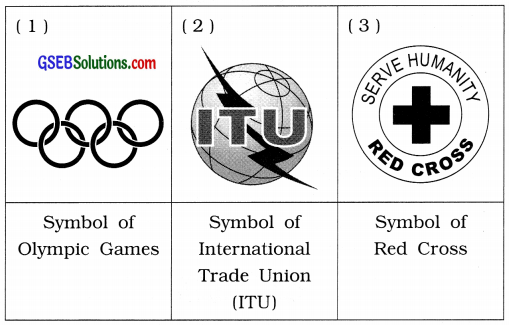
Question 19.
Make a list of Indians who have rendered their services in various Councils of United Nations.
Answer:
| Delegate | Name of the Council | Position held |
| 1. Srimati Vijayalaxmi Pandit | General Assembly of United Nations | President |
| 2. Dr Sarvapalli Radhakrishnan | UNESCO | Chairman |
| 3. Dr Nagendra Singh | International Court of Justice | Judge |
| 4. Shree B. Ramrao | International Court of Justice | Judge |
| 5. Justice R. S. Pathak | International Court of Justice | Judge |
| 6. Dr Homi Bhabha | Atomic Power Council | Chairman |
GSEB Class 8 Social Science The United Nations (U.N.) Additional Important Questions and Answers
Choose the correct alternative from those given below each question:
1.
Question 1.
Who first proposed the thought of forming a World Organization ?
A. George Washington
B. Abraham Lincoln
C. Woodrow Wilson
D. F. D. Roosevelt
Answer:
C. Woodrow Wilson
Question 2.
When was League of Nations established ?
A. In 1920
B. In 1941
C. In 1924
D. In 1945
Answer:
A. In 1920
Question 3.
By whose efforts was the plan of World Organization formed during World War II ?
A. The Prime Minister of England, Churchill
B. The American President, George Washington
C. The American President, E D. Roosevelt
D. The Indian politician, Pandit Jawaharlal Nehru
Answer:
C. The American President, E D. Roosevelt
![]()
Question 4.
When was the United Nations (U.N.) established?
A. On 26th June, 1945
B. On 1st August, 1944
C. On 10th October, 1945
D. On 24th October, 1945
Answer:
D. On 24th October, 1945
Question 5.
How many nations were members of the U.N. at the time of its establishment?
A. 51
B. 21
C. 41
D. 108
Answer:
A. 51
Question 6.
How many nations are members of the United Nations at present?
A. 198
B. 193
C. 191
D. 202
Answer:
B. 193
Question 7.
Which of the following was not included in the main objectives of the U.N, ?
A. To keep feeling of friendliness among the member nations,
B. To maintain international peace and security,
G. To increase business among member nations,
D. To protect human rights.
Answer:
G. To increase business among member nations,
Question 8.
Which day is celebrated as ‘U.N. Day’ every year ?
A. 15th January
B. 24th October
C. 20th December
D. 20th October
Answer:
B. 24th October
Question 9.
Which is the largest organ of U.N. ?
A. Secretariat
B. Security Council
C. Trusteeship Council
D. General Assembly
Answer:
D. General Assembly
![]()
Question 10.
How many maximum representatives to the General Assembly of the U.N. can every member nation send ?
A. 4
B. 5
C. 6
D. 10
Answer:
B. 5
2.
Question 11.
Who was appointed as the President of General Assembly of U.N. in 1953 – 54?
A. Pandit Jawaharlal Nehru
B. Sardar Vallabhbhai Patel
C. Srimati Vijayalaxmi Pandit
D. Dr Nagendra Sinh
Answer:
C. Srimati Vijayalaxmi Pandit
Question 12.
When was the Universal Declaration of Human Rights presented by the U.N. General Assembly?
A. On 24th October, 1945
B. On 10th December, 1948
C. On 1st January, 1951
D. On 31st December, 1960
Answer:
B. On 10th December, 1948
Question 13.
Who possesses the power to allot new membership to U.N. ?
A. General Assembly
B. General Secretary of U.N.
C. Security Council
D. Secretariat
Answer:
A. General Assembly
Question 14.
Which is the most important organ of United Nations ?
A. Economic and Security Council
B. General Assembly
C. Trusteeship Council
D. Security Council
Answer:
D. Security Council
Question 15.
What is the total number of members in Security Council ?
A. 15
B. 21
C. 12
D. 10
Answer:
A. 15
![]()
Question 16.
Which of the following nations is a permanent member of the U.N. ?
A. India
B. Germany
C. China
D. Egypt
Answer:
C. China
Question 17.
Which of the following nations is not a permanent member of the Security Council of U.N. ?
A. U.S.A.
B. France
C. Germany
D. China
Answer:
C. Germany
Question 18.
What is the head of the Secretariat of U.N. known as ?
A. General Secretary
B. President
C. Chairman
D. Chief minister
Answer:
A. General Secretary
Question 19.
How many positive votes of permanent members are necessary for any proposal to be accepted by the U.N. ?
A. Four
B. Three
C. Five
D. Two
Answer:
C. Five
Question 20.
Where are the headquarters of World Health Organization (WHO) ?
A. In Paris
B. In New York
C. In London
D. In Geneva
Answer:
D. In Geneva
![]()
3.
Question 21.
Where are the headquarters of UNESCO?
A. In Berlin
B. In Paris
C. In New York
D. In Geneva
Answer:
B. In Paris
Question 22.
Where are the headquarters of International Labour Organization (ILO) ?
A. In Geneva
B. In New York
C. In Rome
D. In Washington D.C.
Answer:
A. In Geneva
Question 23.
Where are the headquarters of UNICEF ?
A. In Paris
B. In Geneva
C. In Washington
D.C. D. In New York
Answer:
D.C. D. In New York
Question 24.
Where are the headquarters of Food and Agricultural Organization (FAO) ?
A. In Rome
B. In Delhi
C. In Berlin
D. In Paris
Answer:
A. In Rome
Question 25.
Where are the headquarters of World Bank (IBRD) ?
A. In Moscow
B. In Beijing
C. In Washington
D.C. D. In London
Answer:
C. In Washington
Question 26.
During which war did India send a team of doctors for the treatment of wounded soldiers?
A. Vietnam
B. Cambodia
C. Korea
D. Somaliya
Answer:
C. Korea
![]()
Fill in the blanks with proper words or numbers in the following statements:
1.
1. An organization named ……………….. was established for world peace in 1920.
Answer:
League of Nations
2 A deadly weapon like the ………………… was used in the World War II.
Answer:
Atom bomb
3. During the World War II, a plan to constitute an International Organization was formed with the efforts of president …………………. of U.S.A. to establish world peace.
Answer:
E D. Roosevelt
4. The organization that was first known as United Nations Organization is known as the ……………… now.
Answer:
United Nations (U.N.)
5. The headquarters of United Nations (U.N.) are in ……………….. city.
Answer:
New York
6. The number of member nations at the time when the U.N.O. was established was ………………., today that number is ………………… .
Answer:
51, 193
7. Every member nation can send a maximum of five representatives to the ………………… of the U.N.
Answer:
General Assembly
![]()
8. The General Assembly of United Nations meets ………………… in a year.
Answer:
once
9. The General Assembly of United Nations had presented Universal Declaration of ………………… on 10th December, 1948.
Answer:
Human rights
10. The General Assembly of the United Nations can hold discussions and talks about any world problem within the limits prescribed in the ……………………. .
Answer:
Charter
2.
11. The General Assembly possesses the power to admit new members to the ……………… .
Answer:
United Nations (U.N.)
12. ………………….. is the most important organ of United Nations.
Answer:
Security Council
13. The total number of members in Security Council are ……………….. .
Answer:
15
![]()
14. Out of the total number of members in the Security Council …………………. are permanent members, while ……………….. are temporary members.
Answer:
5, 10
15. The temporary members of Security Council are elected by the General Assembly for ………………. years.
Answer:
2
16. The head of the Secretariat of United Nations is known as ‘ ………………. ’.
Answer:
General Secretary
17. The appointment of the Secretary of United Nations is made by the General Assembly on the recommendation of …………………… .
Answer:
Security Council
18. The headquarters of World Health Organization are situated in ………………. city of Switzerland.
Answer:
Geneva
19. The headquarters of UNESCO are situated in ………………. city of France.
Answer:
Paris
20. The headquarters of International Labour Organization are situated in …………… city of Switzerland.
Answer:
Geneva
![]()
3.
21. The headquarters of UNICEF are situated ………………… city of U.S.A
Answer:
New York
22. The headquarters of Food and Agricultural Organization are situated in ……………….. city of Italy.
Answer:
Rome
23. The headquarters of World Bank are situated in …………………. city of U.S.A.
Answer:
Washington D.C.
24. India had sent a team of doctors to treat soldiers wounded in the ………………. war.
Answer:
Korean
25. If all the nations of the world co-operate with the United Nations only then can real …………………. be established.
Answer:
World Peace
![]()
State whether the following statements are true or false:
1. The World War I caused more destruction than the World War II.
Answer:
False
2. The number of members in United Nations (U.N.) at present is 193.
Answer:
True
3. The General Assembly can be called as the Parliament of United Nations (U.N.).
Answer:
False
4. France is permanent member of Security Council.
Answer:
True
5. India possesses ‘Veto Power’ in Security Council.
Answer:
False
6. The headquarter of UNICEF is in New York city of U.S.A.
Answer:
True
![]()
7. The World Bank lends money to Ahmedabad Municipal Corporation.
Answer:
True
8. Total disarmament is necessary for World Peace.
Answer:
True
Match the pairs correctly:
| Section ‘A’ | Section ‘B’ |
| (1) Establishment of League of Nations | (1) General Assembly |
| (2) Establishment of United Nations (U.N.) | (2) Security Council |
| (3) Largest organ of United Nations (U.N.) | (3) 1921 |
| (4) The most important organ of United Nations (U.N.) | (4) 1945 |
| (5) 1920 |
Answer:
(1 – 5), (2 – 4), (3 – 1), (4 – 2).
Answer the following questions in one or two sentences:
Question 1.
When and why was League of Nations established ?
Answer:
League of Nations was established after the World War I in 1920, in order to maintain peace and security in the world at an international level.
Question 2.
Why did the League of Nations fail ?
Answer:
The League of Nations could not protect weaker nations from being attacked by stronger ones. Therefore, it failed.
Question 3.
What can be called ‘World Parliament’ ? Why ?
Answer:
The General Assembly of United Nations (U.N.) can be called as ‘World Parliament’ because it is made of the representatives of all member nations of United Nations.
Question 4.
Who was elected as the president of the General Assembly of United Nations in the year 1953 – 54 ?
Answer:
Srimati Vijayalaxmi Pandit of India was elected as the president of the General Assembly of United Nations in 1953-54.
Question 5.
Which is the most important organ of United Nations ? How many members does it have ?
Answer:
The Security Council is the most important organ of United Nations (U.N.). It has a total of 15 members, of which, 5 are permanent and 10 are temporary.
![]()
Question 6.
Which nations are the permanent members of the Security Council ?
Answer:
US,A., Great Britain. France, Russia and China are the five permanent, member nations of the Security Council.
Question 7.
What is the main function of Security Council of United Nations ?
Answer:
The main function of Security Council of United Nations is to maintain peace and security in the world.
Question 8.
What is the head of the U.N. known as ? Who appoints him?
Answer:
The head of the U.N. is known as ‘Secretary- General’. He is appointed by the General Assembly on the recommendation of Security Council.
Question 9.
What is meant by ‘Right to Deny (Veto Power) ? What is its importance ?
Answer:
‘Right to Deny (Veto Power)’ is the right to cast a negative vote against a proposal put forward in the Security Council. This exceptional right enjoyed by all the five permanent members of Security Council.
Question 10.
What is the main objective of the United Nations (U.N.) ?
Answer:
The main objective of the United Nations (U.N.) is to foster social, economic, cultural and educational development of people and help them to improve their standard of living by generating employment opportunities.
![]()
Question 11.
What is the main function of World Health Organization (WHO) ?
Answer:
The main function of World Health Organization (WHO) is to make efforts to improve the physical and mental health of the people of the world.
Question 12.
What is the main function of UNESCO?
Answer:
The main function of UNESCO is to contribute to peace and security through education, science and culture. It aims to further universal respect for justice, law and human rights.
Question 13.
What is the main function of International Labour Organization (ILO) ?
Answer:
The main function of the ILO is to promote rights at work, encourage decent employment opportunities, enhance social protection and strengthen dialogue on work-related issues.
Question 14.
What is the main function of UNICEF?
Answer:
The main function of UNICEF is to provide long term humanitarian and developmental assistance to children and mothers in developing countries to obtain good standard of living and nutritious food and organize children welfare programmes.
Question 15.
What is the main function of Food and Agricultural Organization (FAO) ?
Answer:
The main function of the FAO is to ensure that people get a regular supply of enough and high quality of food. To promote agriculture.
![]()
Question 16.
What is the main function of the World Bank (IBRD) ?
Answer:
The main function of World Bank (IBRD) is to provide low-interest loans, interest-free credits and grants to developing countries. These support a wide array of investments in such areas as education, health, public administration, infrastructure, financial and private sector development, agriculture and environmental and natural resource management.
Question 17.
Which principles have been given to the world by India for peace in the world?
Answer:
India has given the principles of ‘Panchsheel’ to the world for peace in the world.
Question 18.
What function does Economic and Social Council of United Nations do ?
Answer:
The Economic and Social Council of United Nations works to improve the economic and social conditions for the welfare of people.
Question 19.
What function does the Trusteeship Council of United Nations do?
Answer:
The Trusteeship Council of United Nations helps the nations to acquire freedom from foreign rule.
Question 20.
What function does the International Court of Justice of United Nations do?
Answer:
The International Court of Justice of United Nations solves disputes among member nations.
![]()
Question 21.
What function does the secretariat of United Nations do?
Answer:
The Secretariat of United Nations implements the decisions taken by various organs of U.N.
Question 22.
Who is the current General Secretary of the U.N.?
Answer:
Ban-Ki-Moon of Korea has been the General
Secretary of the U.N. since 2007. He was re-elected to the post in 2011 for a second term at the post.
Answer the following questions:
Question 1.
Which are the special bodies of United Nations (U.N.) ?
Answer:
The special bodies of United Nations (U.N.) are as follows :
- World Health Organization (WHO),
- United Nations Educational, Scientific and Cultural Organization (UNESCO),
- International Labour Organization (ILO),
- United Nations International Children’s Emergency Fund (UNICEF),
- Food and Agricultural Organization (FAO),
- World Bank / International Bank for Reconstruction and Development (WB/IBRD).
Question 2.
State the main functions of each organ of United Nations (U.N.).
Answer:
There are six main organs of United Nations (U.N.). The main function of each organ is as follows :
- General Assembly: The organization of countries to discuss and solve international issues. The General Assembly of United Nations (U.N.) can also be called the ‘World Parliament’. Representatives of all member nations attend it.
- Security Council: It works to safeguard international peace and security. The Security Council enjoys tremendous powers to manage peace and security in the world. Its aim is, as far as possible, to solve disputes between nations diplomatically.
- Economic and Social Council: It works to improve the economic and social conditions for the welfare of the people of the world.
- Trusteeship Council: It helps the nations to acquire freedom from foreign rule.
- International Court of Justice : It helps to solve disputes among member nations.
- Secretariat: It implements the decisions taken by the various organs of U.N.